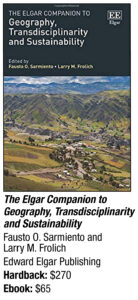 With contributions from top geographers, The Elgar Companion to Geography, Transdisciplinarity and Sustainability frames sustainability as an exemplar of transdisciplinary science (critical geography) while improving future scenarios, debating perspectives between rich North/poor South, modern urban/backwards rural and everything in between. The Companion has five sections that carry the reader from foundational considerations to integrative trends, to resources use and accommodation, to examples highlighting nontraditional pathways, to a postscript about cooperation of the industrialized Earth and a prognosis of the road ahead for the new geographies of sustainability.
With contributions from top geographers, The Elgar Companion to Geography, Transdisciplinarity and Sustainability frames sustainability as an exemplar of transdisciplinary science (critical geography) while improving future scenarios, debating perspectives between rich North/poor South, modern urban/backwards rural and everything in between. The Companion has five sections that carry the reader from foundational considerations to integrative trends, to resources use and accommodation, to examples highlighting nontraditional pathways, to a postscript about cooperation of the industrialized Earth and a prognosis of the road ahead for the new geographies of sustainability.
Offering a cutting-edge, transdisciplinary approach to biophysical and biocultural scales of sustainability, this Companion explores diverse understandings of the what, how, why and where questions of sustainability. It examines the key notion of how to optimize human quality of life whilst minimizing environmental suffering.
Integrating a range of disciplines through the social sciences, natural sciences and arts and humanities, this Companion focuses on the human component of sustainability, using a place-based and lifescape approach to environmental questions. Chapters analyze critical topics including urbanization and city life, environmental conservation and rural landscapes, long-term interactions with natural life and more. Looking beyond an economic analysis of sustainability and well-being, this Companion incorporates cross-cutting social, cultural, judicial and spiritual dimensions of sustainability and regenerative development.
With a combination of international case studies and an interdisciplinary framework for understanding the topic, this will be an interesting read for those studying sustainability from a range of disciplinary bases including ecological economists, human ecologists and geographers. It will also be beneficial to urban planners and ecologists interested in how the profoundly impactful evolutionary trend toward the urban environment is affecting human geographies around the world.
The book is edited by Fausto O. Sarmiento, professor in the Franklin College of Arts and Sciences’ geography department, and Larry M. Frolich, as associate professor in the department of natural sciences at Miami Dade College.







